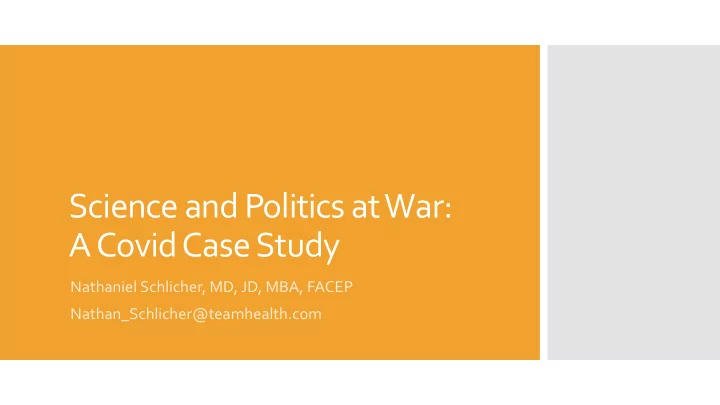

Science and Politics at War: A CovidCase Study Nathaniel Schlicher, MD, JD, MBA, FACEP Nathan_Schlicher@teamhealth.com
Who am I? ER doctor at SJMC Regional Medical Director of Quality, Emergency Medicine Medical Director of Sepsis, CHI Franciscan President of the Washington State Medical Association Past President of Washington Chapter of the American College of Emergency Physicians Former State Senator, recovering attorney, MBA nerd
1. Preclinical (animal) testing. 2. An investigational new drug application (IND) outlines what the sponsor of a new drug proposes for human testing in clinical trials. 3. Phase 1 studies (typically involve 20 to 80 people). 4. Phase 2 studies (typically involve a few dozen to about 300 people). FDA Drug 5. Phase 3 studies (typically involve several hundred to about 3,000 people). 6. The pre-NDA period, just before a new drug application (NDA) is submitted. A common time for the FDA and drug sponsors to meet. Review Steps 7. Submission of an NDA is the formal step asking the FDA to consider a drug for marketing approval. 8. After an NDA is received, the FDA has 60 days to decide whether to file it so it can be reviewed. 9. If the FDA files the NDA, an FDA review team is assigned to evaluate the sponsor's research on the drug's safety and effectiveness. https://www.fda.gov/drugs/drug-information- consumers/fdas-drug-review-process-continued 10. The FDA reviews information that goes on a drug's professional labeling (information on how to use the drug). 11. The FDA inspects the facilities where the drug will be manufactured as part of the approval process. 12. FDA reviewers will approve the application or issue a complete response letter.
Total Time – 12 years FDA Drug Research and Testing Phase (steps 1-6) – 10 Years NDA Process (Steps 7-12) – 6 to 10 months Review Timeline Total Cost – $350 million https://www.drugs.com/fda-approval- process.html
Four criteria to meet: Serious or life-threatening disease or condition Evidence of effectiveness Risk-benefit analysis (some evidence / research) FDA No alternatives Emergency Currently Use 200+ EUA for COVID Testing Authorization 40+ PPE and Devices 3 Drugs – Hydroxychloroquine (revoked) Remdesivir Convalescent plasma – NIH opposes
Part of the Coronavirus Aid, Relief, and Economic Security (CARES) Act that has 10 Billion dollars to accelerate vaccine development Public Private Partnership Johnson & Johnson (Janssen Pharmaceutical)[14] AstraZeneca–University of Oxford[15] and Vaccitech[14] Pfizer-BioNTech[18] Operation Moderna[14] Warp Speed Merck and IAVI[14] Vaxart[14] Inovio[22] Novavax[17] Sanofi and GSK[21] First vaccine – October Surprise? November Election? New Year?
Society is increasingly refusing to trust experts Doctors – COVID 19, Vaccines, Obesity, … Scientists – Climate Change Government – Everything? Growth of personal experts I can research and find my own truth If you can’t answer my questions, you don’t know
Medicine is both Art AND Science Ethics mean we cannot do many scientific experiments on humans Medicine as Thus medicine draws on prior studies, indirect information Science Masks efficacy example – droplet size and stop versus direct infection Decadron study for severe disease versus minor / moderate Lack of all answers, does not mean no answers
“Experts” Doing Damage
Confirmation Bias –You and the writer Look for Red Flags Does it depart from all prior knowledge and research? Evaluating Are the promises almost unbelievable? Scientific Is it a reliable source? Is the source data in a peer reviewed journal? Claims Is the source a reliable expert on the subject? For treatments, is it double blinded randomized trial? Are the results statistically and significant? Are the endpoints ones that matter?
Vaccines and anti-vaxxers Counting Deaths Masks and social distancing Politics and Closing the economy COVID Miracle treatments (hydroxychloroquine) School openings
Perspective on Career / Vocation Did you always feel called to be a doctor? How did you know you should do this work? How did PLU prepare you for this work? What unique contributions has your generation made and what contributions do you see from other generations? What communities do you belong to and how do they enhance your work? How has your understanding of your vocation and service changed over time? What have you discovered about yourself and your work during the past year?
Recommend
More recommend